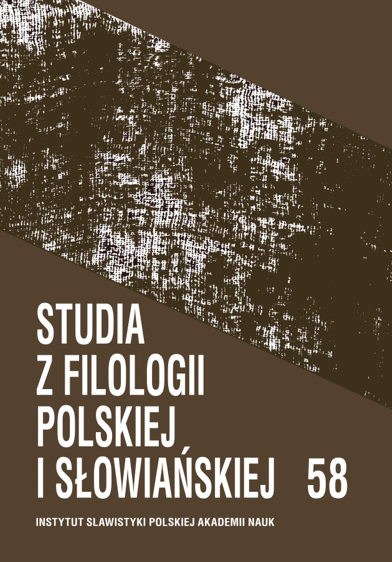Одоризмы как отражение оценочного восприятия в романе Л. Улицкой "Казус Кукоцкого"
Olfactory Vocabulary as a Reflection of Evaluative Perception in Ludmila Ulitskaya’s Novel The Kukotsky Enigma
Author(s): Robert Szymula, Olga AnchimiukSubject(s): Studies of Literature
Published by: Instytut Slawistyki Polskiej Akademii Nauk
Keywords: olfactory vocabulary; seme ‘smell’; literary text; Ludmila Ulitskaya; novel "The Kukotsky Enigma"
Summary/Abstract: The aim of this article is to analyse the olfactory vocabulary in the novel Kazus Kukotskogo by Ludmila Ulitskaya (2001; English edition: The Kukotsky Enigma, 2016). The issues addressed in the novel are topical and controversial. The theme of the degeneration of Soviet man is revealed against the background of his contacts with the odours of the natural world and the world of civilisation. The study applies a general classification of olfactory vocabulary developed on the basis of the research by M. Schleidt, P. Newman and H. Morishita, as well as N. S. Pavlova. Explications of smells in the novel include nouns (zapakh, dukh, aromat, dushok), adjectives (pakhuchiĭ, voniuchiĭ, smradnyĭ, smerdiashchiĭ) and verbs (denoting the manifestation of smell: pakhnutʹ, nesti, voniatʹ; denoting the perception of smell: vdykhatʹ, vtianutʹ/vtiagivatʹ, priniukhivatʹsia, chuiatʹ). The evaluative component gradually intensifies as one moves away from nature and approaches the social aspect of human life. The correlation between the concepts of fragrance (good) and stench (evil, sin) is associated with the characteristics of nature and civilisation. The lexemes used to nominate and characterise negatively labelled odours belong to a civilisation that is far from nature and contrary to its values.
Journal: Studia z Filologii Polskiej i Słowiańskiej
- Issue Year: 2023
- Issue No: 58
- Page Range: 1-21
- Page Count: 21
- Language: Russian

